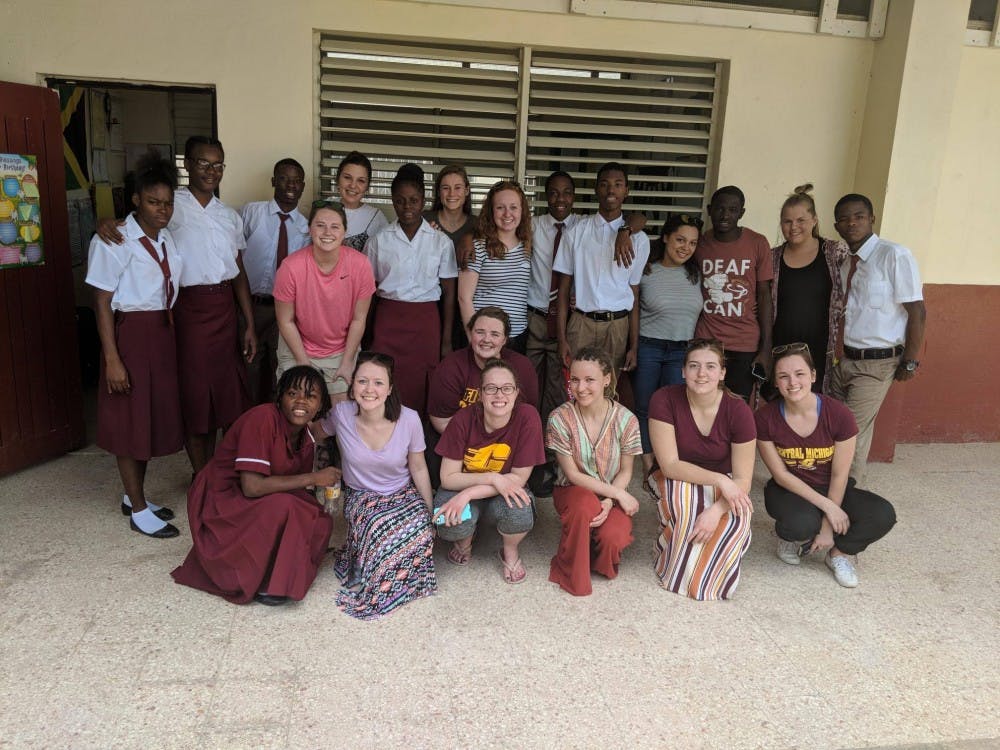CMU classroom works with deaf students on study abroad trip to Jamaica

"Eye-opening" is the word Atlanta senior Rachel Gerrie used to describe her spring break. She, along with 11 other Central Michigan University American Sign Language students, spent her week in Jamaica on a cultural and linguistic learning experience.
"I definitely feel different," she said. "When I first came back, I felt like my room looked different because I was constantly using my eyes through the whole week."
The study abroad program, led by communication disorders faculty Kendra Miller, covers the course ASL 593. During the trip, students had the opportunity to explore Kingston, Jamaica and socialize with students from the Caribbean Christian Centre for the Deaf.
“At first it was super nerve-wracking," Gerrie said. "But after a while, it just became like, 'Hey, what's up?' We were joking around and making inside jokes after a little while and learning about their lives and their dreams and hopes and whether or not their parents were signers."
The CCCD in Kingston is one of three deaf Christian schools on the island, which exists to teach and provide opportunities for deaf students. There are currently 55 students enrolled, and the school offers primary and secondary education, as well as vocational training.
Throughout the week, CMU ASL students communicated only by signing – "airport to airport," said Davison senior Haley Millis, who also went on the trip.
“With the deaf students, at the airport and on the planes, we tried to solely sign with one another," Millis said. "I would do that again in a heartbeat, and I would be fine with not talking at all, all week because you just learn so much."
During the trip, ASL students were able to communicate with CCCD students through games and social events. The students also visited Deaf Can! Coffee, a coffee shop that employs deaf workers and students.
"They gave us a lesson one day on how to make a cappuccino," Millis said. "Very complicated process, but we tried to do it. We usually went to the coffee shop and were able to chat among ourselves and with the students or workers. I just felt like I was always learning something."
For Gerrie and Millis, they recalled their most memorable experience in Jamaica when "One Call Away" by Charlie Puth came on the radio. They ended up translating the entire song into sign for two CCCD students.
"We signed through the whole song together and we were laughing and thought it was the greatest thing," Gerrie said. "Even though we weren't communicating with one another, we were all doing the same thing and on the same wavelength. It was something you would do with your friends."
The study abroad program developed five years ago when Miller was researching an opportunity for students minoring in ASL to apply their skills and experience a different culture. This led Miller to discover the CCCD, and since 2014, she has been leading an annual trip.
“It’s wonderful obviously to go to Jamaica, but what’s really more wonderful is to go to the same school (every year),” Miller said. “We met like little J.D., he was 5 years old five years ago. We met him and then we went back the second year and were like, ‘oh he’s still here’. Third year, ‘there he is, oh my gosh, he’s growing up’. And now he’s 10. It’s kind of like an extended family, but we don’t keep touch during the year.”
Although the CCCD does invite missionaries, the study abroad program is not mission- or volunteering-based.
“Our group goes and our skills are listed as 'ASL' ," Miller said. "We go to connect with people, make friends, socialize and build relationships."
Gerrie and Millis both agreed that their experiences in Jamaica have strengthened their passions for sign language and the deaf community.
Before the trip, Gerrie was planning on applying to Gallaudet University in Washington D.C. to further her career in ASL. Now, she feels her future path has been reaffirmed.
"I feel like this experience really pushed me, it was like 'okay, you really want to do this,'" Gerrie said. "You want to be able to do the things the interpreters were doing there and be at that skill level to be able to communicate without disjunction."






